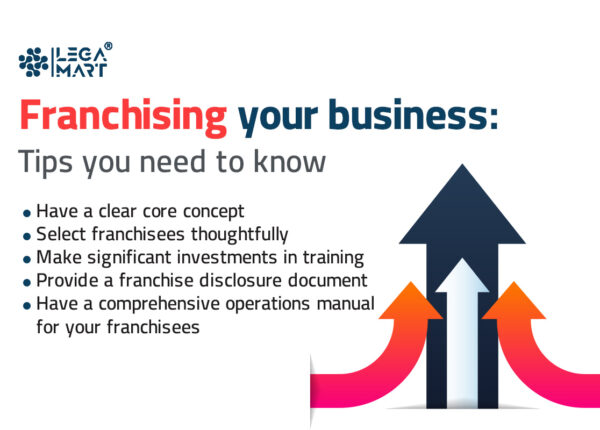Introduction
Franchising your business will allow you to grow your brand and make it popular; instead of starting a business on your own, you will use the credit of a well-known brand. But, there are a few requirements that should be met to guarantee the growth of your business.
These requirements include finding the right lawyer, providing a franchise disclosure document, creating an operations manual for your franchisees, etc.
Think about what would happen if Richard McDonald did not require its franchisees to adhere to its special recipe and standards. The business would not have been as expanded and popular as it is now. That’s how important it is to know the essential tips for starting a franchise.
Franchising in The Perfume Industry: Discover Pros and Cons – Legamart
Franchising your business: Tips you need to know

Have a clear core concept
The initial step in franchising involves identifying those who are genuinely committed to your concept rather than those seeking quick profits. For example, you can incorporate a “value check” into your franchisee selection. Each time a potential franchisee expresses values in line with yours, acknowledge it.
Additionally, as a franchisor, having a well-defined plan in place for even the most basic operations is crucial. Every aspect of the business needs to be integrated into your system, meaning the franchisor must possess a comprehensive understanding of the business. Without the franchisor’s clear, well-defined concept, expecting franchisees to comprehend the business is unrealistic. Clear and explicit instructions for running the business must be provided to each franchisee.
Select franchisees thoughtfully
Choosing the right franchisees ranks among the most critical aspects of expanding your company through franchising. The relationship between the franchisor and franchisees is long-term and requires substantial time and financial investment. Without careful selection, unforeseen issues can escalate and turn contentious.
Avoid hastily recruiting the first interested franchisee. Maintain consistency in your dealings with all prospective members of your network. As a franchisor, be informed about the source of a franchisee’s funding and repayment terms. Additionally, seek franchisees with an entrepreneurial spirit but can operate within the franchisor’s established system.
Make significant investments in training
Comprehensive training benefits both franchisees and franchisors.
At its core, training equips franchisees with the essential knowledge needed for daily operations and a successful start. It ensures employees have the requisite skills and can effectively address challenges.
For franchisors, robust training sets the right foundation for the franchise. Most importantly, it reduces the need to correct errors, saving valuable time. This enables the franchisor’s team to be more productive and ultimately leads to increased profitability
Provide a franchise disclosure document
A franchise disclosure document, the FDD, is the legal document you’ll need to sell franchises. It’s required by federal and state law and is the legal foundation for your franchise.
In the United States, this document should be given to your franchisee no less than 14 days before signing the agreement or accepting payments from a franchisee.
This document is divided into 23 items, informing the franchisee about the franchise, the franchisor, and the legal obligations of both the franchisor and franchisees. You can see a sample of this document.
Therefore, to provide this document, legal and commercial consultation is required.
File or Register your FDD, if required
An FDD or Franchise Disclosure Document may need to be registered or filed depending on your jurisdiction. For instance, currently, 13 states, including New York and Michigan, are franchise registration states. On the other hand, there are franchise filing states such as Texas and North California.
The difference between these two systems is that, in franchise registration states, a franchisor must register its franchise with the state and file its FDD annually. Conversely, a franchisor must do a one-time FDD filing in franchise filing states.
Have a comprehensive operations manual for your franchisees
An operations manual is a document in which the necessary instructions that a franchisee should follow are provided. This is a how-to document containing customer service expectations, customer complaint resolution, employee training, and generally all the standards a franchisee should follow to stay in compliance with the franchisor, hence upholding uniformity across all franchise outlets and expediting the onboarding process for franchisees.
Within your franchise manual, comprehensive guidance must be readily available, equipping new franchisees with the tools necessary to attain the anticipated outcomes and manage their franchises at the desired level of excellence. This comprehensive document should meticulously outline your company’s procedures and policies, offering an exhaustive resource that leaves no room for ambiguity.
Other tips to consider:
Develop a marketing and sales plan
To find your prospective franchisees, consulting with a marketing agency might be helpful. Besides, you need to set aside the required budget for attracting, training, and supporting franchisees.
Choose the right lawyer
Depending on where your business is located and where you want to run its franchise, various regulations may be applicable. There are financial and tax matters to consider when franchising a business. So, you need to consult an expert lawyer who understands the laws and regulations governing those jurisdictions.
Conclusion
Franchising your business is a strategic move that demands careful planning and execution. To embark on this journey successfully, it is fundamental to remember the above essential tips; selecting the right franchisees with a shared vision and passion for your brand is pivotal for long-term success. Additionally, a well-executed franchise model can increase brand presence and profitability. It also demands ongoing dedication and support to ensure the long-term success of your franchised locations and core business. Therefore, adhering to the tips that best suit your business can increase the likelihood of a thriving franchise system that benefits you and your franchisees, creating a win-win scenario for all stakeholders involved.
Frequently asked Questions
How do I know if a particular franchise is a good investment?
When contemplating purchasing a franchise, you aim to secure a stake in a thriving enterprise that yields substantial profits while avoiding entanglement with a declining brand or an agreement that disproportionately benefits the franchisor. It is, therefore, prudent to conduct thorough research into the potential financial health and growth of the franchise.
Additionally, a meticulous examination of the franchise agreement is imperative to safeguard your rights and assess the acceptability of its provisions. Many aspiring franchisees find it advisable to enlist the expertise of a seasoned attorney or financial advisor to review the franchise agreement and associated documents. Remember, like any contract. It becomes exceedingly challenging to alter or exit the agreement once signed.
How much money can I make by owning a franchise?
The potential income within a franchise operation hinges on several key factors, such as the financial obligations tied to loan repayments, the franchise fees and other essential reinvestments into the business, and the obligatory tax liabilities that must be met.
However, to gain a deeper insight into the earnings potential of a specific franchise, consider engaging with existing franchise owners and pose the following inquiries:
- What has been your annual income since the inception of the franchise?
- What portion of your earnings did you retain as personal income?
- Were there any unforeseen or unexpected expenses that impacted your earnings?
Furthermore, location plays a critical role in shaping your profits. The presence of the same franchise or a close competitor within a few miles can significantly influence your financial outcomes.




